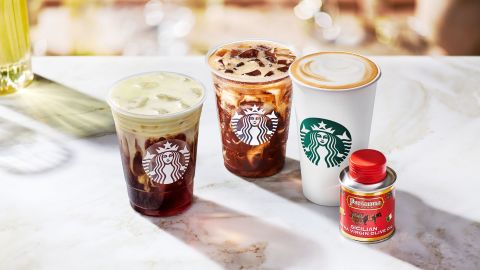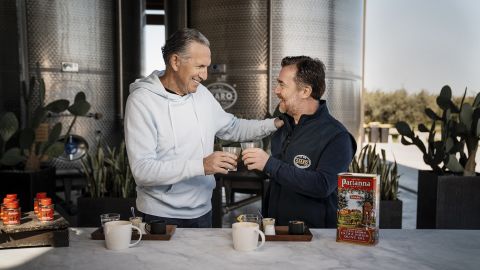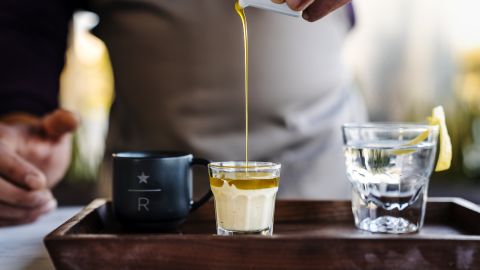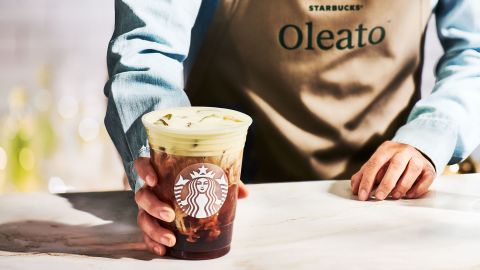Starbucks’ new drinks have a spoonful of olive oil in every cup
Starbucks wants you to give olive oil coffee a shot. Really.
The coffee chain is rolling out a new line of beverages made with extra virgin olive oil. To be clear, the drinks are not simply flavored with olive oil, nor do they have just a hint of it. Each one is truly made with a spoonful of oil, adding 120 calories to the total. With some drinks, you can see a slippery sheen of oil in the cup, and you don’t even have to squint.
Three olive oil beverages are available for sale at Starbucks cafes in Italy starting this week. Each includes Oleato, Starbucks’ word for th
There’s an Oleato latte with oat milk and olive oil, an Oleato ice shaken espresso with oat milk, hazelnut flavor and olive oil, and the Oleato golden foam cold brew, made with a version of Starbucks’ sweet milk foam infused with two olive oil servings. Versions of those drinks will arrive in Southern California this spring, with more details about the US launch to come. They’ll roll out in other markets in the UK, Middle East and Japan this year.

Like other major chains, Starbucks often tweaks its menu, rolling out limited-edition items seasonally or introducing new ingredients like oat milk. But this launch is much bigger, Brady Brewer, Starbucks’ chief marketing officer, told CNN.
“It is one of the biggest launches we’ve had in decades,” he noted. “Rather than a flavor or a product, it’s really a platform,” he said, meaning that customers will be able to use olive oil to customize some drinks.
The company is betting that people will hear about the concoction and try it because they want to know what it tastes like. And, perhaps, because they’ve heard that there are health benefits to extra virgin olive oil.

With Oleato, Starbucks is going out on a limb. Adding fat to coffee is not new. You can do it the old-fashioned way, with cream or milk, or even butter. Recipes for olive oil coffee exist online.
But consumers are certainly not clamoring for olive oil coffee. And Starbucks is launching the line at a time when supply chains are fragile, consumers are watching their budgets and baristas, some of whom are so frustrated with the company they’re joining a union, are already contending with complicated drink orders.
So why is Starbucks launching this major new line? Two words: Howard Schultz.
Coming full circle
Last year Schultz met olive oil producer Tommaso Asaro, who introduced him to the practice of consuming a tablespoon of olive oil each day. Schultz learned more about the practice this summer while visiting Sicily, and then picked the habit up himself. He wondered if he could combine it with his daily coffee routine.
“When we got together and started doing this ritual I said to [Asaro], I know you think I’m going to be crazy, but have you ever thought of infusing a tablespoon of olive oil with Starbucks coffee?” Schultz, currently Starbucks’ interim CEO, told CNN’s Poppy Harlow. “He thought it was a little strange.” Asaro is the chairman of United Olive Oil, through which Starbucks is sourcing its olive oil.

For Schultz, making business decisions based on visits to Italy is not new.
Schultz joined Starbucks in 1982, 11 years after the first Starbucks location opened its doors (the original Starbucks sold whole coffee beans). Back in 1982, Starbucks was still just a tiny operation, with four stores altogether. Schultz, who had come on board as director of operations and marketing, visited Milan in 1983 and became enamored of the city’s cafe culture. The rest, he says, is history.
“My Starbucks journey will come full circle when I return to Milan later this month to introduce something much bigger than any new promotion or beverage,” Schultz said during a February analyst call, teasing the new line.
Speaking with CNN’s Harlow, he predicted that the new platform will “transform the coffee industry,” and be “a very profitable new addition to the company.”
It’s one thing to toy with the idea of adding olive oil to coffee on a whim, and another to come up with a suite of beverages that can attract customers the world over.
For that, Schultz turned to his Starbucks team back in Seattle, where the coffee chain has its headquarters. There, they had to figure out how to make olive oil coffee taste good.
A unique case
Typically, Starbucks doesn’t come up with new beverages based on ideas from the CEO.
“This is a pretty unique case,” Brewer told CNN. But, he noted, “we have ideas that come from everywhere.”
Starbucks’ beverage team came up with about 12 options, which were whittled down to the three that are now available in Starbucks’ Italian cafes. (The Starbucks Reserve Roastery in Milan will serve five Oleato drinks, including a deconstructed espresso drink, an iced cortado and an espresso martini, all of which include olive oil).
Starbucks opened its first Italian location, the roastery, in 2018, a decision that was met with raised eyebrows from locals. But five years later, it’s managed to expand within the country. for the launch of Oleato, Schultz is once again in Italy to see how Italians react. “What if they don’t like it?” Harlow asked. In that case “I won’t be coming back to Seattle,” Schultz quipped.

In recent years, beverage companies have incorporated into their recipes ingredients like turmeric or CBD, which customers see as healthy or offering certain benefits, like aiding sleep. Starbucks isn’t making any health claims with Oleato, but it’s hoping that people, through their own research, will come to see it as a healthy choice.
And those extra 120 calories? “We haven’t seen that as a barrier,” Brewer said. “We’re not too concerned about that.”
Brewer and Schultz dismissed some of the other challenges, as well.
And as to the likelihood of people shelling out extra cash for the oil, Brewer said that customers see Starbucks as an “affordable luxury.” In the last three months of 2022, sales at Starbucks stores open at least 13 months jumped 5% globally, despite higher prices.
The way Brewer and Schultz see it, the only risk is if the beverages don’t deliver on taste.
The proof, they say, is in the cup.
The taste test
In New York, this reporter got to taste four Oleato drinks: The hot oat milk latte, golden foam cold brew, ice shaken espresso with oat milk and hazelnut, and an iced cortado like the one being served at the roastery in Milan.
I could see the oil in the cold drinks — it gave the cold foam a pale green tinge and appeared as a thin, bubbly layer on the shaken espresso and cortado.
On the first sip, I liked all of them. To me, the golden foam on the cold brew had the strongest olive oil taste — nutty and sweet and surprising, as promised. I could detect it in the cortado and the espresso in a more subtle way. In the hot latte, I couldn’t really taste it at all.

But after a few sips of each, it felt like too much.
I usually drink regular coffee with a plant-based milk, preferably unsweetened. So the sweet cold drinks — the shaken espresso and cortado, especially — felt like a delightful indulgence. They would have been great without the olive oil, which seemed like an unnecessary flourish.
Starbucks describes the drinks as lush and velvety, thanks to the oil. But to me they just started to feel weighed down. And for a while after I tried the beverages, I could feel the oil on my lips.
As it turns out, I prefer my olive oil with food. Starbucks will have to wait to see if most people disagree.
Discover more from ReviewFitHealth.com
Subscribe to get the latest posts sent to your email.
